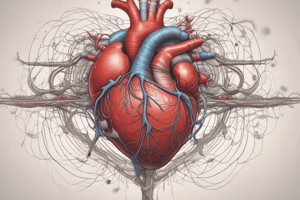Podcast
Questions and Answers
Which of the following structures contains oxygenated blood? (Select all that apply)
Which of the following structures contains oxygenated blood? (Select all that apply)
- Right Atrium
- Aorta (correct)
- Superior Vena Cava
- Right Ventricle
Which of the following structures is included in the pulmonary circuit?
Which of the following structures is included in the pulmonary circuit?
- Pulmonary Artery (correct)
- Aorta
- Right Atrium
- Coronary Artery
Which of the following structures is included in the systemic circuit?
Which of the following structures is included in the systemic circuit?
- Aorta (correct)
- Right Ventricle
- Pulmonary Artery
- Right Atrium
Which of the following structures contains oxygenated blood?
Which of the following structures contains oxygenated blood?
What is the blood flow sequence from the aorta?
What is the blood flow sequence from the aorta?
The interior of a blood vessel is called the:
The interior of a blood vessel is called the:
The blood vessel with the thickest tunica media is the:
The blood vessel with the thickest tunica media is the:
Blood vessels that carry blood away from the heart are the:
Blood vessels that carry blood away from the heart are the:
Which of the following blood vessels contains oxygenated blood?
Which of the following blood vessels contains oxygenated blood?
After performing a routine venipuncture, the phlebotomist noticed the blood in the evacuated tube was bright, cherry red. What vessel did the phlebotomist likely puncture?
After performing a routine venipuncture, the phlebotomist noticed the blood in the evacuated tube was bright, cherry red. What vessel did the phlebotomist likely puncture?
The blood vessel whose wall is 1 cell layer thick is the:
The blood vessel whose wall is 1 cell layer thick is the:
Which of the following blood vessels contains a mixture of oxygenated and deoxygenated blood?
Which of the following blood vessels contains a mixture of oxygenated and deoxygenated blood?
Which of the following structures connect arterioles and venules?
Which of the following structures connect arterioles and venules?
Which of the following blood vessels allows gas and solute exchange between blood and tissues?
Which of the following blood vessels allows gas and solute exchange between blood and tissues?
Which of the following specimens has the lowest concentration of oxygen?
Which of the following specimens has the lowest concentration of oxygen?
The blood vessels with 1-way valves in the lumen are called:
The blood vessels with 1-way valves in the lumen are called:
Which of the following blood vessels contains deoxygenated blood?
Which of the following blood vessels contains deoxygenated blood?
After performing a routine venipuncture, the phlebotomist noticed that the blood in the evacuated tube was dark red. What vessel did the phlebotomist likely puncture?
After performing a routine venipuncture, the phlebotomist noticed that the blood in the evacuated tube was dark red. What vessel did the phlebotomist likely puncture?
Blood enters the right side of the heart through the:
Blood enters the right side of the heart through the:
Blood enters the left side of the heart through the:
Blood enters the left side of the heart through the:
The substance that causes fibrinogen to convert to fibrin is:
The substance that causes fibrinogen to convert to fibrin is:
An element critical to coagulation function in vivo and in vitro is:
An element critical to coagulation function in vivo and in vitro is:
The 3 components of hemostasis are:
The 3 components of hemostasis are:
Which of the following proteins is found in plasma, but not serum?
Which of the following proteins is found in plasma, but not serum?
Normal plasma is composed of primarily:
Normal plasma is composed of primarily:
Flashcards are hidden until you start studying
Study Notes
Blood Circulation and Structures
- Aorta contains oxygenated blood, transporting it from the heart to the body.
- Pulmonary artery is part of the pulmonary circuit, carrying deoxygenated blood to the lungs.
- Aorta is involved in the systemic circuit, delivering oxygenated blood to body tissues.
- Veins such as the inferior and superior vena cava carry deoxygenated blood to the right atrium.
Blood Flow Pathway
- Sequence of blood flow from the aorta: arteries, arterioles, capillaries, venules, veins.
Blood Vessel Characteristics
- Lumen refers to the interior space within a blood vessel.
- Arteries possess the thickest tunica media for strength and elasticity.
- Arteries transport blood away from the heart, while veins bring it back.
- Capillaries have walls that are one cell layer thick, enabling efficient gas and solute exchange.
Oxygen Content in Blood
- Arteries are the only blood vessels that typically contain oxygenated blood.
- Capillaries contain a mixture of oxygenated and deoxygenated blood due to their function in exchange.
- Venous blood has the lowest oxygen concentration.
Observation and Phlebotomy
- Bright cherry red blood in an evacuated tube indicates arterial blood from a puncture in an artery.
- Dark red blood suggests venous blood collected from a vein during venipuncture.
Heart Chambers and Blood Return
- Blood enters the right side of the heart via the superior vena cava.
- Blood enters the left side through the pulmonary veins, bringing oxygenated blood from the lungs.
Coagulation Factors
- Thrombin is essential for converting fibrinogen into fibrin during clot formation.
- Calcium is critical for coagulation processes both in vivo (within the body) and in vitro (outside the body).
Components of Hemostasis
- Hemostasis involves blood vessels, platelets, and coagulation factors for maintaining blood stability post-injury.
- Fibrinogen is found in plasma but is absent in serum, indicating its role in coagulation.
Plasma Composition
- Normal plasma consists primarily of water, which forms the bulk of its content, with solutes like proteins and electrolytes dispersed throughout.
Studying That Suits You
Use AI to generate personalized quizzes and flashcards to suit your learning preferences.




